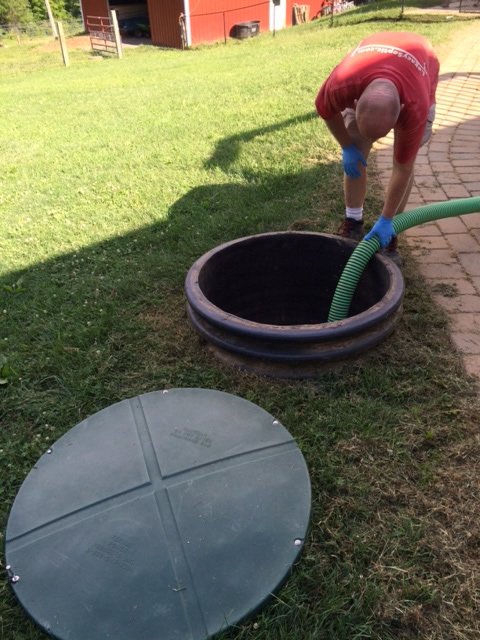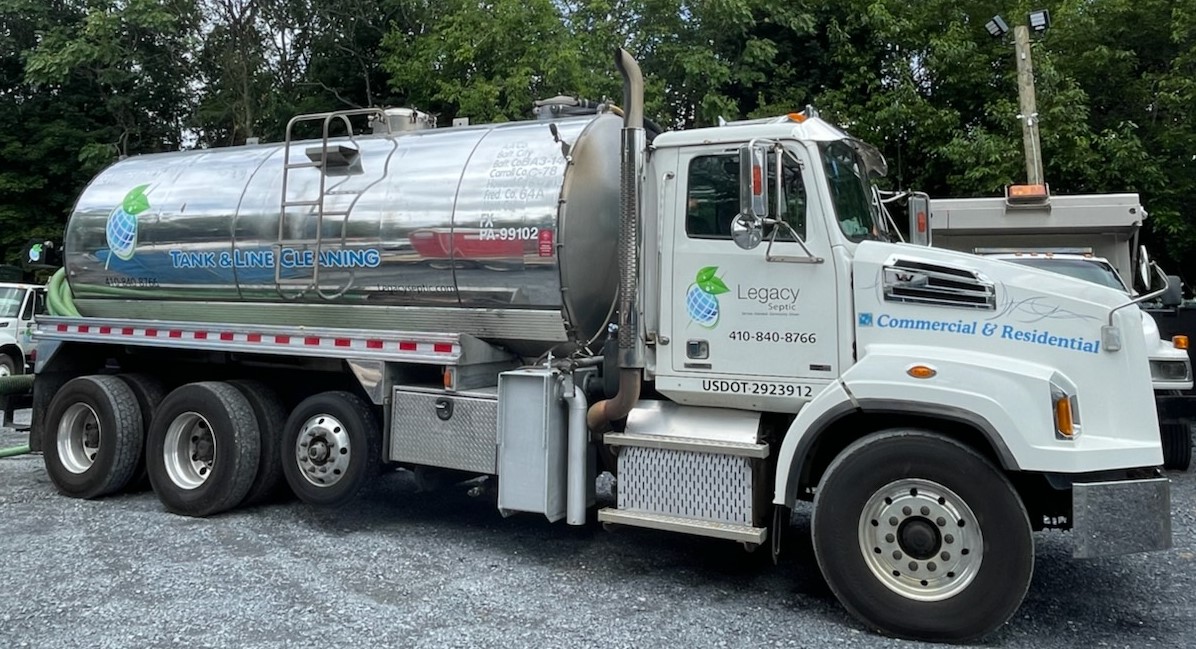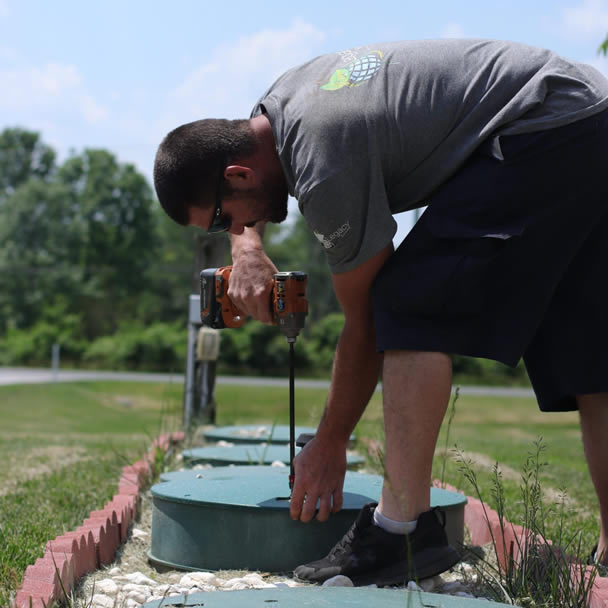Septic Pumping in Reisterstown, MD
What Reisterstown, MD, Homeowners Can Expect from Legacy Septic Pumping Services
Choosing Legacy means we get right to work by coordinating with the local Health Department to pull up your septic system’s records. Our goal is to know your system inside out.
When it’s time for your service, we send out one of our skilled technicians to take care of the septic tank pumping. They’ll find the best route to your tank, making note of any potential obstacles like difficult access points or pets, and figure out how much hose will be needed. They’ll also measure and observe carefully to help decide how often you’ll need our pumping services.
After the visit, our expert will go over the notes and measurements, suggest any repairs or improvements, and talk through any concerns before completing your file.
And remember, Legacy is here for you 24/7 for any emergency septic needs. Just call us at 410-840-8766 whenever you need.
Why Is it Important To Get Your Septic Pumped?
Regular septic system pumping is essential for a variety of reasons, mainly concerning the system’s effectiveness, durability, and its impact on the environment:
Avoids System Breakdowns: Solids accumulate at the bottom of your septic tank as sludge, while lighter materials like oils and grease rise to form a scum layer. Without routine pumping, these solids can overfill the tank, diminishing its performance and possibly causing system failures. This situation may lead to sewage backing up into your home or effluent on the surface, posing significant health risks and necessitating costly repairs.
Keeps the System Running Smoothly: Pumping your tank regularly ensures it continues to efficiently process your household’s waste. A system in good condition separates solids from liquids effectively, allowing the treated water to safely filter through the drain field. This step is crucial in preventing the pollution of groundwater and soil.
Increases System Longevity: Although designed to last for decades, a septic system’s lifespan can be drastically reduced by neglect. Routine maintenance, including pumping, keeps the system’s components functioning well, thereby extending the system’s life and avoiding the financial burden of premature replacement.
Safeguards Groundwater and Soil: A functioning septic system properly processes waste before it reaches the groundwater. Regular pumping is vital to keep solids within the tank and prevent them from obstructing the drain field, which could result in untreated sewage polluting groundwater and soil, posing severe health threats and potentially causing disease outbreaks.
Ensures Compliance and Enhances Property Value: Local laws often mandate septic tank inspections and pumping every few years to prevent environmental hazards. Non-compliance can lead to fines and legal complications. Moreover, a septic system in good condition is a selling point for properties, providing assurance to buyers that they won’t encounter septic issues shortly after purchase.
The recommended pumping frequency varies based on your tank’s size and household size, typically between every 3 to 5 years. Homes with garbage disposals, higher water usage, or larger families might require more frequent services. A consultation with a septic system expert can help determine the best maintenance schedule for your specific situation.
What Is The Septic Pumping Process?
Septic pumping is a detailed process aimed at clearing out the build-up of solids and scum from your septic tank, keeping your system running smoothly. Here’s a breakdown of what typically happens:
Finding the Tank: The first order of business is figuring out where the septic tank is. Some people know exactly where theirs is, but if not, don’t worry—a septic service professional can find it with special tools, even if it’s hidden underground.
Getting into the Tank: After finding the tank, the next step is to get into it. This might mean digging until you reach the tank lids. If you have a newer tank, it might have risers that make it easy to access without any digging. But for older tanks, a shovel will be necessary to uncover the lid.
Tank Inspection: Before pumping begins, the technician will take a look inside the tank to see how full it is and check for any damage or leaks that might need fixing.
The Pumping Process: At the heart of the operation is the extraction of all materials from the septic tank. This is achieved with a heavy-duty vacuum truck outfitted with a robust vacuum pump. A substantial hose is maneuvered into the tank via the access point, and upon activation of the pump, a vacuum force is generated. This powerful suction removes the accumulated sludge (solid waste), scum (comprising fats, oils, and grease), and effluent (liquid waste), transferring them into the truck’s containment tank.
Inspecting and Cleaning: With an empty tank, the technician can really see if there are any problems like cracks or leaks. This step often includes washing the tank’s sides to make sure nothing is missed.
Getting Rid of the Waste: The materials extracted from your tank are not indiscriminately disposed of. Instead, they are transported to a specialized treatment facility, where they undergo processing to either be converted into products such as fertilizer or treated in accordance with stringent environmental standards.
Wrapping Up: After everything is pumped out, and any necessary checks or clean-ups are done, the tank’s lid is put back on. If the ground was dug up to access the tank, it’s filled back in.
Final Touches: The technician might have some advice on how to keep your tank in tip-top shape or suggest when to schedule the next pump. You’ll also get a report on what was done and any findings from the inspection.
Keeping up with regular septic tank pumping is essential to avoid system breakdowns, make your septic system last longer, and protect both the environment and public health. How often you need it depends on the size of your tank, how many people are in your household, and how much wastewater you produce.
How Often Should I Get My Septic Pumped?
Tank Capacity: The larger your septic tank, the more it can accommodate solids before a pump-out is necessary, whereas smaller tanks reach capacity more quickly.
Household Size : A higher number of residents leads to increased wastewater and solid waste production, hastening the fill rate of the tank.
Water Consumption: Elevated levels of water usage result in a greater flow of effluent through the tank, accelerating the build-up of the solid layer.
Solid Waste Contributions: Activities such as using a garbage disposal, doing laundry frequently, and other habits can raise the volume of solids entering the system, sometimes necessitating more regular pump-outs.
Based on these considerations, the following are rough guidelines for scheduling septic tank pump-outs:
- 1 to 2 residents: Every 3-4 years
- 3 to 5 residents: Every 2-3 years
- 6 or more residents: Every year to 2 years
These recommendations serve as a general framework, but individual circumstances may lead to adjustments. For instance, a large family using a small tank might require more frequent service than the guidelines suggest. On the flip side, a large tank with only one or two users might not need servicing as often.
Modifying household behaviors to lessen the burden on your septic system can also be beneficial. Efficient water use, avoiding the disposal of non-degradable items in toilets or sinks, and steering clear of pouring grease or harmful chemicals down drains can all contribute to less frequent pumping requirements.
Regular inspections by a septic system professional are advisable as well. An inspector can evaluate the levels of sludge and scum, inspect for any system damage, and provide tailored advice on pumping intervals based on your specific usage and the tank’s condition.
Proactive maintenance and careful water and waste management within your household are key strategies for prolonging your septic system’s lifespan and avoiding expensive repairs or replacements.

Request Pumping Service
"*" indicates required fields
Call Us
Text Us
Other Septic Services
Septic Installation
Legacy Septic is your go-to expert for professional septic system installations, tailored to perfectly suit your property’s unique requirements. Our team, known for their detail-oriented approach, leverages cutting-edge technology and adheres to the strictest safety and efficiency protocols. From the initial steps of soil testing and designing your system to the final touches of installation and inspection, Legacy Septic ensures a smooth, worry-free process. Our dedication to top-notch quality and customer satisfaction positions us as a reliable choice for homeowners in need of dependable septic solutions. Choose Legacy Septic, where we prioritize a meticulous and personalized installation approach, guaranteeing your septic system’s long-term effectiveness and superior functionality.
Plus, we’re unmatched in speed when it comes to delivering your septic tank—once the permits are in hand, we’re all set to go.
Septic Preventive Maintenance
Preventive maintenance is key to prolonging the lifespan of your septic system and guaranteeing its efficient operation. Regular maintenance not only helps you sidestep typical issues associated with septic systems but also keeps your system functioning smoothly.
Our septic preventive maintenance services include:
- Sewer Ejector Pump Preventive Maintenance Program
- Sandmound Preventive Maintenance Program
- BAT (Norweco) Septic Maintenance Program
Water/Sewer Line Repair
Even homes connected to the city’s water and sewer infrastructure can face issues with their water and sewer lines. These critical pipelines can suffer from a range of problems, such as cracks, breaks, corrosion, tree root encroachment, freezing temperatures, wear from aging, and shifts in the ground. Legacy Septic provides a full array of water and sewer line services, standing by to respond quickly and prevent any harm to your property.
About Legacy Septic
Our mission is clear—whether we’re assisting first-time homebuyers, current homeowners, or sellers rushing to meet a deadline, Legacy approaches every situation with a teacher’s heart. We aim to ensure that young couples don’t make a property purchase without being aware of any hidden issues. It’s crucial for homeowners to understand the steps that can enhance the efficiency and longevity of their septic systems. Sellers, particularly those looking towards retirement, need to be able to confirm to potential buyers that their septic system is well-kept and in top-notch condition. We achieve these objectives through our community education initiatives and personal visits to the site. Your trust is invaluable to us.




About Reisterstown, MD
Reisterstown is an unincorporated community and census-designated place in Baltimore County, Maryland, As of the 2020 census, it had a population of 26,822.
It was founded by German immigrant John Reister in 1758. He purchased a 20-acre tract of land, which he called “Reister’s Desire,” along the Conewago Road on March 2, 1758. He built a tavern on the site, providing food, drink, and lodging for travelers. Other businesses serving travelers soon followed, creating the settlement known as Reister’s Town and eventually Reisterstown.
Reisterstown is located to the northwest of Baltimore. The center is designated the Reisterstown Historic District and was listed on the National Register of Historic Places in 1979. Just outside the community, to its north, is the small military reservation of Camp Fretterd, which serves as a training site for the Maryland Army National Guard and Air Guard. The Maryland Defense Force is also headquartered at Camp Fretterd.
The Reisterstown Area Recreation Council (RRC) organizes athletic and recreational activities for the Reisterstown area. Reisterstown has two annual festivals organized with help from the RRC. The Bloomin’ ArtsFest, at the Franklin Middle School grounds, held in May, and the Reisterstown Festival, at Hannah More Park, held in September. Every year, the Reisterstown Main Street organizes free concerts on Friday nights from late spring till early fall.
Service Oriented. Community Driven.
Proudly serving Carroll, Baltimore, Howard and Frederick Counties, including Owings Mills, Reisterstown, Monkton, and Parkton for over 35 years!
Get Social With Us!
Contact Us!
2914 Hanover Pike
Manchester, MD 21102
Telephone: 410-840-8766
Email: info@legacyseptic.com
Text: 240-372-2744
© 2025. All Rights Reserved. | Privacy Policy




